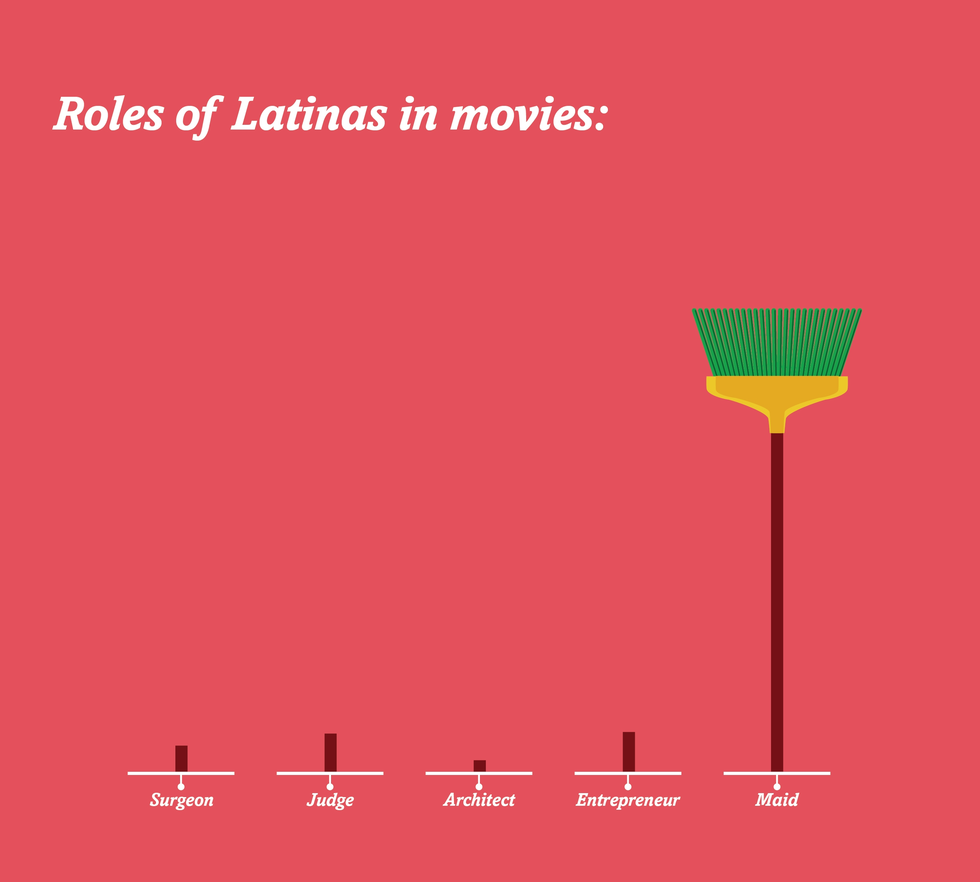Author's note: Latinx with an "x" is meant to be inclusive of Latinos, Latinos and those within and outside the gender binary.
I originally intended to write an article with Donald Trump's or Kelly Osbourne's comments as my focus, but let's be real, they aren't the first, nor will they be the last, to spread negative stereotypes about Latinxs. Instead, I will extend my knowledge to the average person who has either internalized negative stereotypes about us or has played an active role in perpetuating them. The truth is, I'm tired of hearing, seeing and reading about the ignorance we face at the hands of others. My aim is to hopefully get you thinking to what extent stereotypes affect us.
1. They don't acknowledge the vast diversity in the Latinx community.
Often when people are faced with the word Latino/a they already have a preconceived idea of what this person looks like. For folks who have never seen or interacted with a Latinx in person, this idea may be the only thing they know. The appearance of Latinxs has been propagated by TV, movies and even history books. The problem is, this image is not inclusive to the vast amount of diversity in the Latinx population. Latinxs exist of different skin tones, facial and body features, personality traits, among other things. In fact, because Latin American history heavily consists of White colonizers and enslaved Africans, you can identify as Black or White and still be Latinx. Let's not forget, regardless of appearance only we can assume our own identity. No one else should feel entitled to.
However, when a Latinx is expected to look, act or speak a certain way and they don't their "Latin-ness" is questioned. In high school, I had a hard time fitting in with the Latinx community. My best friend was actually white, and because I am light-skinned, I was passing as white. I received comments like "You're a Latina, but it's OK because you look white" that were meant to be taken as compliments, as if being or looking like a Latina was a bad thing. Today, I still get comments for not "being Latina enough" just because I don't look or talk like Sofia Vergara. Sometimes I was even accused of posing as white which made me feel like I was betraying my family roots.
2. They can foster an identity crisis in Latinx youth.
As a first-generation Latina, I was pressured to assimilate to white culture, but then I was punished for it. This brought me a great deal of confusion during my teen years. I got to the point of feeling ashamed of who I was and wished I was just born white. This was a big deal. I look back and think of all the time I wasted feeling embarrassed of being a Latina, instead of embracing my culture like I do now. No one should never have to feel that way. Yet the reality is most youth who aren't white question their value in our society because we are taught early on that somehow we are not good enough being who we are.
This led to a great deal of insecurity when I started college. Was I worthy of being a student at a primarily white institution? Will my professors think my vocabulary is not up to par when they read my papers? Unfortunately, this wasn't all in my head. Latinxs, like most people of color experience microaggressions far too frequently. I've heard students say the only reason we get in is because the college is trying to make the school more diverse. As if we weren't qualified enough to get accepted on our own merits.
3. They perpetuate the idea that a Latinx's purpose in the United States is to serve white people.
I wasn't surprised when Kelly Osbourne said “If you kick every
Latino out of this country, then who is going to be cleaning your toilet,
Donald Trump?” The media is largely at fault for this. I can watch 100 movies and not see one Latinx. And when I do, they would most likely be cast as a gardener or housekeeper. Not only is this sending a message that this is all we can amount to, but it devalues these occupations, just like most jobs that are predominantly held by people of color.
And then there are Trump's comments about how Mexican immigrants are rapists and criminals. Does he not know that many corporations and big businesses rely on undocumented citizens to work at the bottom with low pay wages and no benefits? How hypocritical is it to say "they are taking over our country" when there is a high demand for people who are willing to work under these conditions? These corporations are saving millions of dollars by not having to treat their employees as decent human beings. Yet, no one calls them out for being criminals. Interesting.
Stereotypes are no joke. They affect how we are perceived by others and even how we think of ourselves. If you're responsible for perpetuating negative stereotypes, I challenge you to replace them with positive ones. Latinxs are persistent. We are willing to make sacrifices for the better, and we have great sense of pride in our culture. Similarly, if you have internalized negative stereotypes, I challenge you to think about ways these stereotypes shape the value you put on Latinxs and how this might be reflected in our society.

















 Photo by
Photo by  Photo by
Photo by  Photo by
Photo by 










